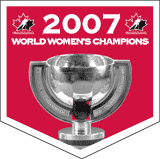2007 IIHF Women's World Championship
|
United States
4 -
Canada
5
|
|||||||||||||||||||||||||||||||||||||||||||||||||||||||||||||||||||||||||||||||||||||||||||||||||||||||||||||||||||||||||||
|
Matchup: USA 4 vs. Canada 5, 3:30 p.m., MTS Centre | IIHF Summary SHOOTOUT MADNESS: WICKENHEISER LIFTS CANADA OVER USA By Lucas Aykroyd The opening game of the Playoff Round at Winnipeg’s MTS Centre on Saturday was a true see-saw struggle. To the delight of the sell-out crowd, a pink-clad Canadian squad rallied from a 4-2 second-period deficit to earn a 5-4 shootout victory over the archrival USA. Hayley Wickenheiser scored the decisive goal. Shooting fourth after Natalie Darwitz and Julie Chu had failed to score for the USA and Sarah Vaillancourt likewise for Canada, Wickenheiser skated in with a series of dekes and then beat USA netminder Jessie Vetter five-hole. Gigi Marvin missed her chance to keep the Americans alive by firing the puck over the crossbar. “I think it was a great game for the fans, but from our standpoint, it wasn’t our best game,” said Wickenheiser, Team Canada’s captain. “We came out of it with a win, but we still have a lot of work to do. Sure, you gotta score to win, but I don’t want to be ‘winning games’ for us. I want [all] four lines to be rolling. I think it’s always a team effort, but when you get into a shootout, anything can happen.”
This was the most anticipated game of the tournament to date, and if it was a preview of the gold medal game, women’s hockey fans are in for an action-packed doozy. “I thought our defence handled the pressure well,” said Head Coach Melody Davidson. “They did some good things, but it wasn’t so much about our defence. Sometimes it was our wingers on the wall, just making better decisions. We had our ups and downs, but overall, I was OK with what we were doing.” Under the new IIHF three-point system, Canada receives two points for this shootout win and the USA gets
one point for the loss. The result is an important step toward a gold medal game berth for Canada, but much
still depends on what happens between the USA and Finland on Sunday and Canada and Finland on Monday.? Natalie Darwitz and Krissy Wendell had a goal and an assist apiece for the Americans, while Jenny Potter and Gigi Marvin added singles. “It’s a huge rivalry, and we have work to do,” said Potter. “We can’t come out flat like that. We have to come out and be all over them to win battles. They’re a good team.” The first IIHF World Women’s Championship meeting between these two teams since the 2005 final featured a youth-on-youth matchup of goalies, with Canada’s 24-year-old Charline Labonté versus the USA’s Vetter, age 21. Final shots favoured Canada 31-29. “Playing the US is always a good game, always good times,” said Labonté. “Those are the kinds of games we want to play. But this was a weird game. It was either garbage goals or beautiful goals. I don’t think I gave up any bad goals, and I don’t think [Vetter] did either.” The American power play, which entered this game clicking at a tournament-best 71.4 percent, managed one goal on three power play opportunities. The attendance at the USA-Canada game set a new IIHF single-game record of 15,003. The teams started off skating at a tempo previously unparalleled in this tournament, and tape-to-tape passes and ramped-up physical play were also on display. Canada jumped into a 1-0 lead at 1:21 when Kelly Bechard went hard to the net and tipped in a feed from Katie Weatherston past Vetter’s left skate. At 3:19, Labonte showed she was ready to play, flashing the leather to thwart Jenny Potter when the American forward broke into the Canadian zone and snapped a quick shot on goal. The USA went to the power play a minute later after Gillian Apps was nabbed for hooking, but the best opportunity went to Canada shorthanded, as Sarah Vaillancourt got a step on USA blueliner Angela Ruggiero and nearly got a full breakaway, with Gina Kingsbury following up unsuccessfully on the rebound. Ruggiero’s hooking minor on the play nullified the American advantage. At 7:49, Jenny Potter created the USA’s 1-1 tying goal off the rush, as she fed the puck left to Kristin King and then cashed in the rebound with a half-empty net after Labonté made the original stop. The teams traded quality chances past the midway point of the period, and both goalies came up big. Hayley Wickenheiser raced down right wing and fed a trailing Tessa Bonhomme in the slot for a chance Vetter stopped, and the Americans came right back, with Erika Lawler setting up Natalie Darwitz and forcing Labonté to slide across. The Americans grabbed a 2-1 lead at 17:47 when Darwitz circled into the slot and unleashed a high wrister that was tipped by Krissy Wendell and beat Labonté high over the glove through traffic. Canada drew even early in the second period on a two-man advantage, as the USA ran into penalty trouble with three consecutive minors. Wickenheiser’s blueline drive was stopped by Vetter, but she couldn’t control the rebound, and Vaillancourt batted it high into the net at 3:21. At 6:52, the Americans made it a 3-2 lead when Meghan Duggan fed Gigi Marvin in the faceoff circle to Labonte’s left, and Marvin zinged a wrister high past the Canadian goalie on the short side. Just over two minutes later, it was 4-2 when the Americans stormed the Canadian net during a man advantage, and Darwitz and Wendell were the catalysts again. Darwitz fed Wendell cross-crease, and Labonté barely stopped the puck with her glove as it trickled behind her, but Darwitz was able to tuck in the rebound. Canada could have collapsed, but it didn’t. The crowd’s chants of “Go Canada Go” seemed to inspire the host team. At 12:23, Canada cut the deficit to 4-3 when Gillian Apps caused an American turnover in the defensive zone and fed Wickenheiser perfectly on a 2-on-1 down low, enabling the captain to hesitate and then fire a perfect shot glove side. Then at 14:57, the Canadians tied it up when Wickenheiser’s shot from the faceoff circle to Vetter’s right deflected to Apps, who had the open side of the net to bang in the puck. Labonté made a brilliant save on an American shorthanded 2-on-1 late in the second period. Erika Lawler backhanded the puck across to Gigi Marvin, and the Canadian netminder flung her arm down to block Marvin’s attempt. The physicality, stickwork and pace really picked up in the third period, with almost no whistles in the first half. Canada went to the power play at 8:20 when Darwitz illegally creamed Wickenheiser inside the American blueline. Vetter foiled Daniele Goyette on a good close-in chance, and deflected away a Colleen Sostorics blast from the line. The USA had a great chance to get the go-ahead goal when Apps was sent off for hooking, again, at 16:08. Canada’s plight worsened at 17:23 when Bechard pushed Darwitz into the sideboards from behind, putting the Americans on a two-man advantage. The Americans called a time-out to formulate strategy, and their power play subsequently exerted enormous pressure. But Labonté proved equal to the test, stoning Darwitz by her right post, Molly Engstrom from the blueline, and Wendell in close by the other post. The teams skated furiously as regulation time wound down. Canada couldn’t capitalize on two big chances in overtime. The USA’s Jenny Potter stopped skating and hooked Caroline Ouellette in the neutral zone at 3:25 of the extra frame. During the ensuing man advantage, Vetter made her best stop on Jennifer Botterill after Jayna Hefford’s cross-crease feed. With 1:08 left in the 10-minute overtime, Potter took a kneeing penalty, but Canada couldn’t get anything going. Following the first period, 16 members of the gold medal-winning 1990 World Championship team were introduced to the crowd (excluding Vicky Sunohara), along with Scott McMaster, whose father Dave (now deceased) coached that team, and members of the 1990 staff. A big-screen video montage of 1990 highlights got a big round of applause. The Player of the Game for Canada was, naturally, Hayley Wickenheiser, while Natalie Darwitz was chosen for the USA. --- USA: With 13 consecutive losses to Team Canada, the Americans can’t be feeling overly cocky as they head into this key Playoff Round encounter. However, their last win came right here in Winnipeg on New Year’s Day 2006, and they are the defending world champions from 2005. In addition, Mark Johnson’s squad has performed admirably so far in back-to-back victories over Kazakhstan (9-0) and China (9-1). With skilled forwards like Natalie Darwitz and Sarah Parsons leading the charge, the USA’s most dangerous weapon may be its power play, which has clicked at a whopping 71.4 percent so far (five goals on seven man advantages). Top defenceman Angela Ruggiero has demonstrated that her remedy for getting booted off The Apprentice is to rack up points versus opposing hockey nations, as she’s picked up a goal and three assists to go with her +5 plus-minus rating. Fellow blueliner Caitlin Cahow isn’t far behind with two goals and an assist, and ditto for Molly Engstrom (a goal and two assists). Canada will have to watch out for the American defence’s ability to join the rush and pinch in from the point. There’s really not much to judge about the quality of the goaltending so far, since veteran Chanda Gunn and newcomer Jessie Vetter have only faced 14 shots apiece in their individual starts. It would seem logical for Gunn to get the call today, since she’s the one who backstopped the Americans to the 2005 title with a sparkling 0.52 GAA. She also has something to prove after being outdueled in the semi-final shootout versus Sweden at the Turin Olympics. Canada: The Canadians have been excellent so far, but there’s still a sense that they can take their game to another level. Scoring 17 goals in two games on 133 shots is nothing to complain about; still, Head Coach Melody Davidson knows those results came against lower-level competition, and the Americans aren’t going to hand out any freebies. The duo of Hayley Wickenheiser and Danielle Goyette, ranked 1-2 in tournament scoring, has done everything that could be expected so far. Wickenheiser may have a shot at equalling her 2006 record of 17 points in one tournament (the Turin Olympics), and she has been beautifully relentless in her pursuit of the puck and determination to find the holes. With two goals and an assist, Jennifer Botterill has also clearly fed off the energy of playing in front of family and friends in Winnipeg. Whether you’re talking Meghan Agosta, Katie Weatherston, or Jayna Hefford, there’s offensive potential on every Canadian line. The defence has been impeccable to date, helping the team surrender zero power play goals, and Delaney Collins, Colleen Sostorics, and Tessa Bonhomme have been particularly impressive. Canada’s goaltending will be tested for the first time after giving up a paltry 22 shots on goal through two games. Getting up for this game emotionally won’t be a problem. Really, in the last couple of days, players on both teams have bandied about words like “hate” and “enemy” more freely than your average NHLer does prior to a playoff series. The pro-Canadian crowd will ramp up the intensity. It’ll be a classy, skillful battle, but a battle nonetheless. Unless the Finns can pull off an upset, the winner of this game will probably end up topping the group. Lucas Aykroyd |
|||||||||||||||||||||||||||||||||||||||||||||||||||||||||||||||||||||||||||||||||||||||||||||||||||||||||||||||||||||||||||
|
|||||||||||||||||||||||||||||||||||||||||||||||||||||||||||||||||||||||||||||||||||||||||||||||||||||||||||||||||||||||||||
|
|
|||||||||||||||||||||||||||||||||||||||||||||||||||||||||||||||||||||||||||||||||||||||||||||||||||||||||||||||||||||||||||



 HOCKEY CANADA
HOCKEY CANADA

 It was the first shootout in a non-elimination or non-placement game in
the history of IIHF women’s competition.
It was the first shootout in a non-elimination or non-placement game in
the history of IIHF women’s competition.